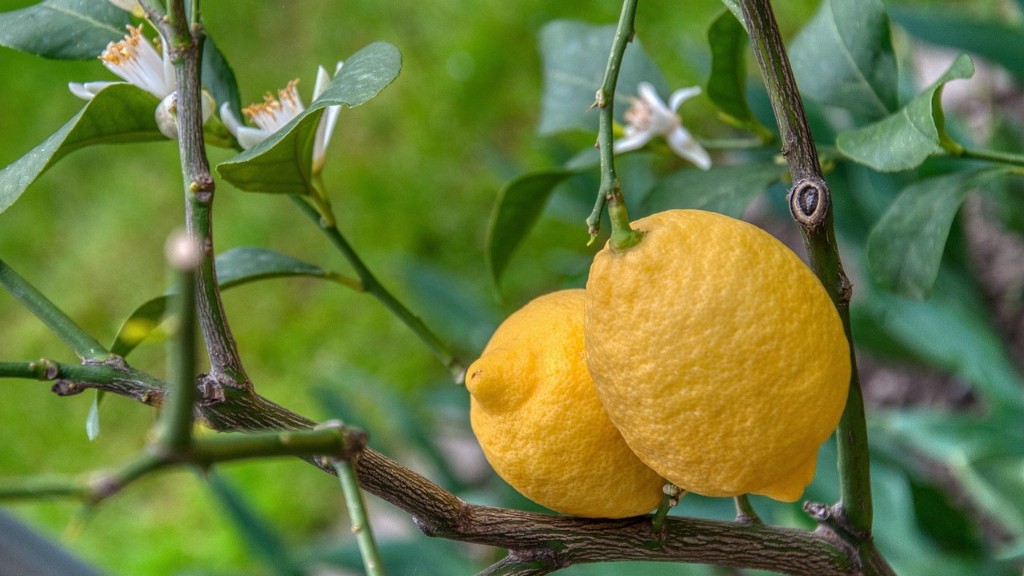Can I plant a lemon tree outside? Yes, you can! Lemons are an easy fruit tree to grow and can be planted both indoors and outdoors. The key to successful lemon growing is to provide plenty of sun and water. Lemons require at least 12 hours of direct sunlight a day. Although lemons can grow in a range of soil types, they prefer fast draining soil with a neutral pH. When planting outdoors, take the time to prepare the soil properly by adding compost or manure to help retain water and increase nutrition.
Planting a Lemon Tree
When planting a lemon tree outdoors, its important to provide good drainage and plenty of sun. The ideal location to plant is somewhere that gets at least 6 hours of direct sunlight. Before planting, select a planting site that is away from any existing trees or large objects, as these can cast a shadow over your lemon tree. When planting, ensure that the soil is moist and well-drained.
Dig a hole that is 2 to 3 times the width of your lemon tree’s root ball. To provide a safeguard against diseases, it is best to mix 1-2 tablespoons of nitrogen fertilizer with the soil before backfilling the hole. After planting, firmly press the soil into place and water the tree. Make sure not to over-water your tree, as this can harm the roots.
Generally, the Best Climate for Lemon Trees
Lemon trees thrive best in warm, sunny climates. They can tolerate temperature drops to as low as 30 degrees Fahrenheit and can tolerate occasional frost. If you live in a colder climate, consider planting your lemon tree in a container so that you can move it indoors when the temperature drops.
In hot climates, providing shade from intense heat is essential to avoid scorching the tree’s leaves. Consider planting your lemon tree in a spot that receives partial shade in the hottest part of the day. Additionally, ensure that you water your tree regularly, as lemon trees require consistent moist soil to produce fruit.
Caring for a Lemon Tree After Plantation
As a citrus tree, your lemon tree will need regular fertilizing. Fertilize your trees in spring and fall with a fertilizer specially designed for citrus trees, such as Fish Emulsion. A balanced fertilizer like 10-10-10 or 8-8-8 can also be used. Avoid fertilizing tree during the high heat of summer.
Lemon trees also benefit from pruning to maintain the shape, maximize fruit production, and promote air circulation. When pruning, make sure to thin out the tree’s branches and leaves, and remove any dead or diseased branches.
Pests and Diseases of the Lemon Tree
Lemon trees are fairly resistant to pests and diseases, however, they can be prone to certain issues. Common pests that may affect lemon trees include aphids, caterpillars, scale, and mealybugs. To deter these pests, it is best to monitor your tree regularly and take immediate action if any pests are spotted.
Common diseases that can affect lemon trees include fungal and bacterial diseases. If your tree is suffering from any of these diseases, contact a professional for assistance. Occasionally, lemon trees may be affected by root rot. To prevent this, ensure that your tree’s soil remains moist but not wet.
Proper Care for a Healthy Lemon Tree
Growing a lemon tree outdoors is definitely possible, however, it is important to provide proper care for the tree to reach its full potential. Ensure that your tree is planted in a spot that receives at least 6 hours of direct sunlight per day and well-draining soil. Provide regular watering, adequate nutrition, and pruning to keep your tree healthy.
Fruits and Yield of the Lemon Tree
Lemon trees typically reach full fruit-bearing age within three to five years. The tree can be expected to produce anywhere from 10 to 20 pounds of lemons in a single theyear. To maximize yield, ensure that the tree receives adequate sunlight, is pruned regularly and fertilized with a citrus-specific fertilizer.
Harvesting and Storing Lemons
When your lemons are ripe and ready to harvest, simply cut them from the tree with a pair of sharp pruning shears. To extend the life of your lemons, store them in the refrigerator for up to two weeks. Additionally, you can make your own lemon syrup or freeze the juice from your harvested lemons for later use.
Common Problems Causes by Weather
Adverse weather can cause a variety of problems for lemon trees, including freezing temperatures and excessive rain. Freezing temperatures can damage or even kill the tree. To help prevent cold damage, consider planting your lemon tree in a container, so that you can bring it indoors or move it to a warmer spot when temperatures drop. If your tree is affected by heavy rain, it is best to create a drainage system or a raised bed to help keep your tree’s roots dry.



